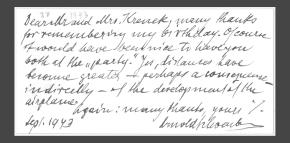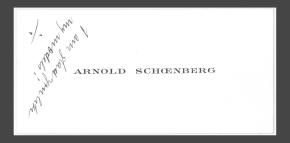‘Music and Cultural Mobility in the 20th Century. Ernst Krenek, Arnold Schönberg, and their contemporaries’
The concept of ‘cultural mobility’ expands our understanding of art and culture by conceptualising the mobility of people in geographical, social and cultural spaces and the products of their creativity as a dynamic relational structure. Lectures at this symposium will address these questions in relation to Ernst Krenek, Arnold Schönberg, their contemporaries and their historical, geographical and cultural spaces of action.
from 21 to 23 May 2025
in
Arnold Schönberg Center
Schwarzenbergplatz 6
1030 Vienna
Free admission!
"Dear Mr and Mrs Krenek, many thanks for remembering my birthday. Of course it would have been nice to have you both at the “party.” Yes, distances have become greater – perhaps a consequence indirectly – of the development of the airplane.
Again: many thanks, yours Arnold Schoenberg
Sept. 1943
I am glad you like my models!"
From the archive of the Ernst Krenek Institute
Preliminary Program
Wednesday, 21 May 2025, 14.30
Opening
Ulrike Anton, director of Arnold Schönberg Center
Nils Grosch, chairman of the board of Ernst-Krenek-Institute
15.00 – 16.30
Dan Deutsch (Haifa, ISR): Western Art Music Between Nations and Empires
Felix Wörner (Frankfurt/Main, DE; Basel, CHE): Transatlantische Perspektivwechsel. Zwischen Deutungshoheit und Deutungsverlust zwölftontechnischer Verfahrensweisen in den USA der 1930er-Jahre
16.30 keynote
Marcus Gräser (Linz, AT): Cultural Mobility and Cultural Nationalism. On some paradoxes in the American cultural landscape in the 1930s
18.30 concert
Trio Nacedo
Lidia Sierra, violin
Inés Moreno, viola
Clara Muñoz, violoncello
Ernst Krenek, Parvula corona musicalis, Op. 122
Ludwig van Beethoven, Trio G major Op. 9, No. 1
Arnold Schoenberg, String Trio, op. 45
Xavier Montsalvatge, Cuadrivio para tres stradivarius
Thursday, 22 May 2025, 9.00 – 10.30
Belén Vega-Pichaco and Germán Gan-Quesada (Logroño and Barcelona, ESP): Ernst Krenek and his Music in “Enigmatic” Francoist Spain
Fusako Hamao (USA): Listening to Schoenberg in Early Postwar Japan
Kristin Van den Buys (Brüssel, BE): Schoenberg and Brussels in the interwar period (1919-1939)
11.00 – 12.30
Philip Stoecker (New York, USA): “You’ve made a discovery here”: Ernst Krenek’s influence on George Perle
Frank Heidlberger (Texas, USA): “I don’t know where I belong” – Serialism and Cultural Mobility in Krenek’s work of the 1950s
Anton Vishio (Toronto, CAN): Krenek’s Sestina as a Narrative of Mobilities
14.30 – 16.00
Till Jonas Umbach (Vienna, AT): Ernst Krenek und die Maschine. Leben und Schaffen in Zeiten des technischen Wandels
Johann Larson Lindal (Linköping, SWE): Between Movement and Stability in Interwar Contemporary Music: The Mobility of Ernst Krenek’s Early Berlin Compositions
Florian Giering, Tommaso Graiff (Leipzig, DE): Von Das Nationale und die Kunst zum „transplanted composer“ und zurück zur „Lust aufs Unmögliche“: Mobilitätsparadigmen im essayistischen Werk Ernst Kreneks
16.30 – 18.00
Ricardo Athaide Mitidieri (São Paulo, BRA): H. J. Koellreutter and the twelve-tone composition in Brazilian context: 1937-1950
Sebastiano Gubian (Berlin, DE): Die Rolle der Phänomenologie von Husserl in der Rezeption, Verbreitung und Migration der Zwölftonmusik durch Europa
Jeff Nichols (New York, USA): Total Serialism Meets American Pragmatism in the Music of Milton Babbitt
Friday, 23 May 2025, 9.00 – 10.30
Hiram Kümper (Mannheim, DE): Kulturelle Mobilität in Julius Bahles musikpsychologischen Studien und in den Antworten seiner Probanden
Charlotte Carayol (Bordeaux, FR): Das „jüdisch-politische“ Kabarett „Die Arche“ (1943-1944). Wiener zionistische Kleinkunst im New Yorker Exil
Irit Youngerman (Haifa, ISR): Between Berlin, Paris, and Palestine: The Musical Mobilities of Verdina Shlonsky
11.00 – 12.00
Friedemann Pestel (Tübingen, DE): Kulturelle Mobilität als globales Möglichkeitsfenster. Die Wiener Philharmoniker in Lateinamerika 1922/23
Assaf Shelleg (Jerusalem, ISR): Tragic Actants
12.00 – 13.00
Roundtable Cultural Mobility
(Chair: Assaf Shelleg)
Cooperation Ernst Krenek Institute and Arnold Schönberg Center.



